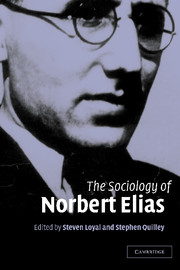Book contents
- Frontmatter
- Contents
- List of contributors
- Acknowledgements
- 1 Towards a ‘central theory’: the scope and relevance of the sociology of Norbert Elias
- Part I Sociology as a human science: Norbert Elias and the sociology of knowledge
- Part II Processes of stratification: figurations of race, class and gender
- Part III The formation of individuals and states
- 9 Not so exceptional? State-formation processes in America
- 10 Armed peace: on the pacifying condition for the ‘cooperative of states’
- 11 Changing regimes of manners and emotions: from disciplining to informalizing
- 12 Elias and modern penal development
- 13 Elias, Freud and Goffman: shame as the master emotion
- Part IV Religion and civilizing processes: Weber and Elias compared
- Index
- References
9 - Not so exceptional? State-formation processes in America
Published online by Cambridge University Press: 22 September 2009
- Frontmatter
- Contents
- List of contributors
- Acknowledgements
- 1 Towards a ‘central theory’: the scope and relevance of the sociology of Norbert Elias
- Part I Sociology as a human science: Norbert Elias and the sociology of knowledge
- Part II Processes of stratification: figurations of race, class and gender
- Part III The formation of individuals and states
- 9 Not so exceptional? State-formation processes in America
- 10 Armed peace: on the pacifying condition for the ‘cooperative of states’
- 11 Changing regimes of manners and emotions: from disciplining to informalizing
- 12 Elias and modern penal development
- 13 Elias, Freud and Goffman: shame as the master emotion
- Part IV Religion and civilizing processes: Weber and Elias compared
- Index
- References
Summary
Introduction
‘America’, said Alexis de Tocqueville in 1840, ‘is … the one country in the world where the precepts of Descartes are least studied and most followed’ (2000: 403). In their common assumptions Americans sought ‘to escape … from the yoke of habits, from family maxims, from class opinions, and, up to a certain point, from national prejudices; to take tradition only as information, and … to seek the reason for things in themselves and in themselves alone’. In short, ‘each American calls only on the individual effort of reason’. To say nevertheless that Americans had rarely troubled to define the rules of this philosophic method was a little unfair. This rational individualism, which has remained a force in American politics and culture to the present day, is a legacy of the Enlightenment spirit to which so many of the great intellectuals among the Founding Fathers contributed. To adapt Keynes's famous remark, Americans in Tocqueville's perception were the slaves of long-defunct philosophes. If Tocqueville had been looking for really unrecognized philosophical debts, he might have pointed to another strain of idealism: Hegelianism. For with the passage of time, the United States, and especially its Constitution, came to be represented as almost an emanation of the human spirit.
- Type
- Chapter
- Information
- The Sociology of Norbert Elias , pp. 157 - 174Publisher: Cambridge University PressPrint publication year: 2004
References
- 2
- Cited by



